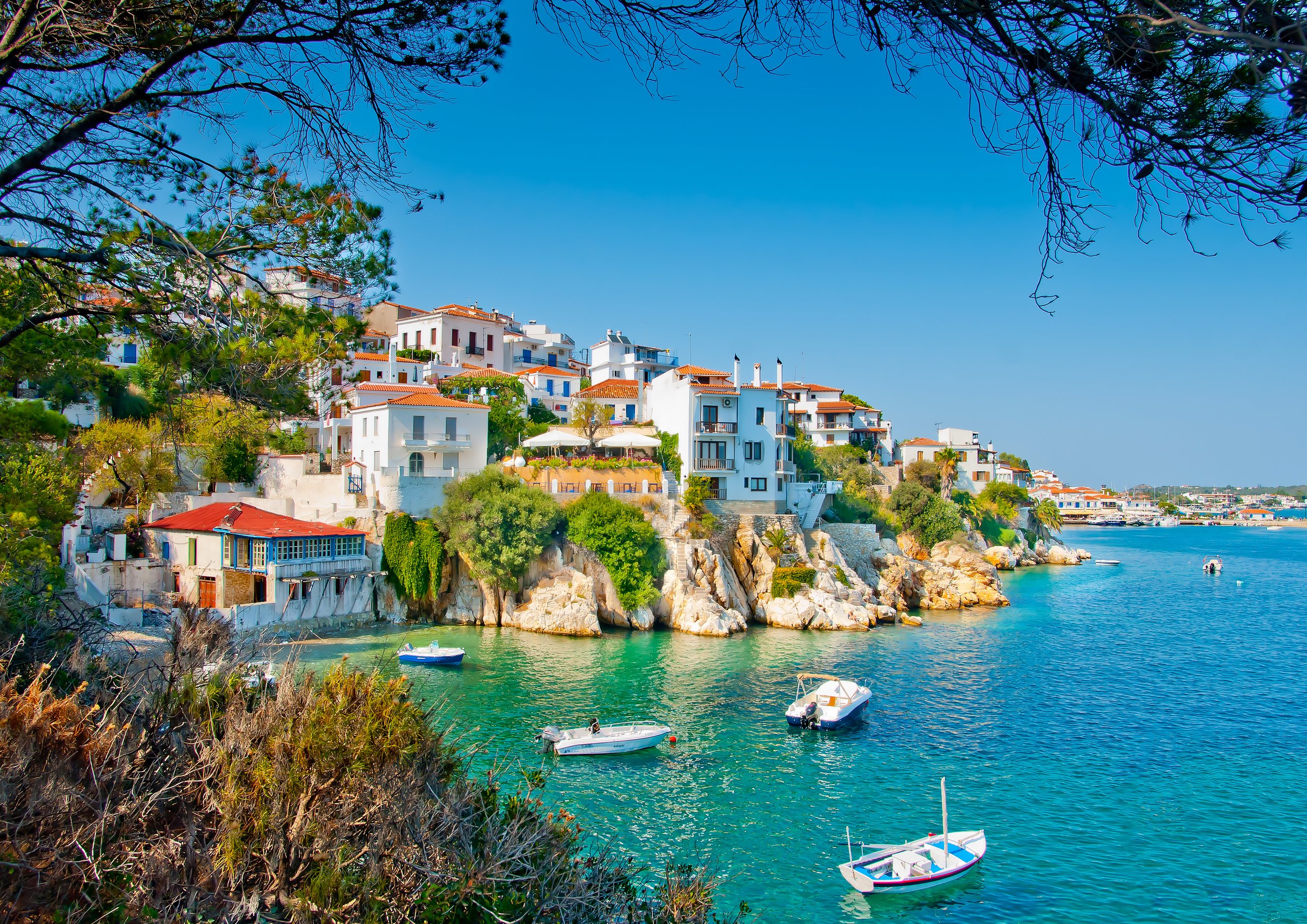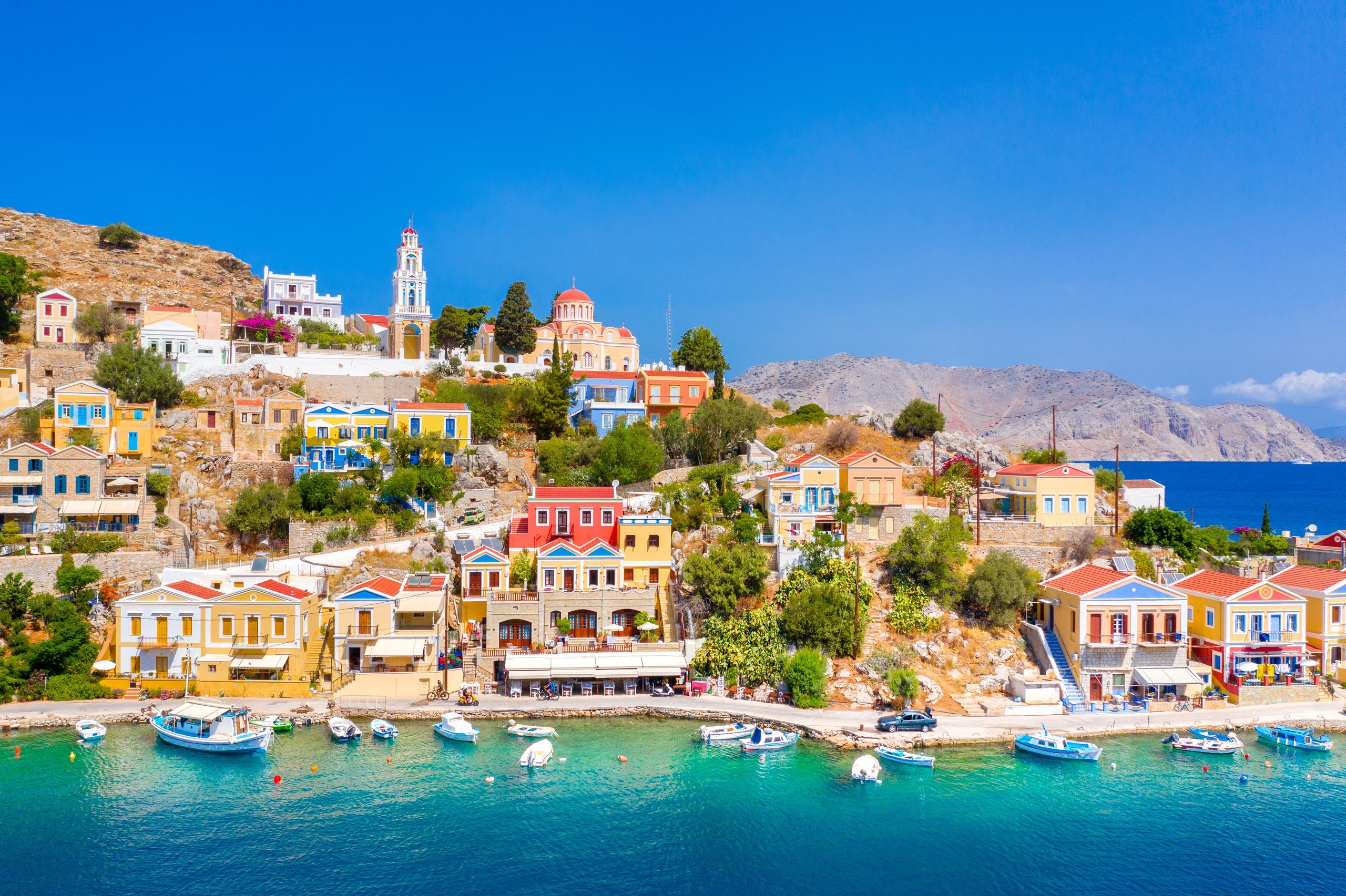Sunshine, sea views and a slower pace of life: retiring to Greece offers all this and more. From golden visas to great-value homes, this guide covers everything you need to plan your Mediterranean retirement with confidence.
If you’re picturing long lunches under olive trees, gentle coastal walks and a cost of living that doesn’t break the bank, retiring to Greece could be the new life you’ve been looking for. But what about visas, healthcare and where to live? In this guide, we’ll break it all down so you can take the next step with confidence.
Download the Greece Buying Guide
Contents
Why retire to Greece
Year-round sunshine
With more than 2,500 hours of sunshine each year, Greece is twice as sunny as northern Europe. Sunshine is not just good for Vitamin D – mild winters can ease joint conditions and encourage a more active, outdoor lifestyle all year round.
Affordable properties
In rural Greece and on smaller islands, it’s possible to find homes in need of renovation for under €50,000. Even a ready-to-move-into property close to shops, cafes and the sea can cost a fraction of similar options in Spain, France or Italy.
Lower cost of living
Compared to the UK, Ireland, France or the US, daily life in Greece is more affordable. Property taxes, groceries, eating out, fuel and travel are generally lower. According to Numbeo, the cost of living in Greece is, on average, 21.5% lower than in the UK and 22.5% lower than in the US.
A healthy lifestyle
The Mediterranean diet is rich in heart-friendly oils, fresh veg, lean proteins and pulses. Many expats quickly adopt a healthier routine in Greece, with regular walks, fresh local produce and less stress. And while healthcare isn’t entirely free, it’s well regarded and accessible.
Plenty to keep you busy
Retirement doesn’t have to mean slowing down. Greece offers everything from scuba diving and sailing to ancient history and UNESCO World Heritage sites. Fancy writing that novel or learning Greek dance? Now’s your chance.

Retirement visas in Greece
If you’re an EU citizen, moving to Greece is simple. It’s a matter of registering with your local town hall and showing evidence of your income and health insurance. For Brits, Americans and Australians, the process is more involved – but still very achievable.
Can I retire in Greece part-time?
Yes. Non-EU nationals can stay in Greece (and anywhere in the Schengen Area) for 90 days out of every 180 without a visa. So, if you’re only planning to semi-retire, this could work. Just keep in mind the 90-day limit is across all Schengen countries combined, not just Greece.
Main retirement visa options
| Visa type | Key requirements | Best for |
|---|---|---|
| Digital nomad visa | €3,500+/month remote income; not employed in Greece | Semi-retired consultants and freelancers |
| Financially Independent Visa (FIP) | €2,000+/month passive income, no work, private healthcare | Full retirees not planning to work |
| Golden visa | Property purchase from €250,000 to €800,000+ | Investors and those wanting Schengen access |
FIP visa in detail
The Financially Independent Visa is a popular option for retirees. It lasts two years and is renewable. You can apply for permanent residency after five years. To qualify for renewal, you must spend at least 183 days in Greece each year.
You’ll need:
- Proof of €2,000/month (€24,000 annually) passive income (plus 20% for a spouse, 15% for each dependent)
- Proof you’re not working, such as a pension statement or letter from a former employer
- Clean criminal record (translated and certified)
- Evidence of housing (rental contract or ownership)
- Comprehensive private healthcare cover
Applications are made via the Greek consulate in your home country and usually take three months.
Golden visa updates
The golden visa allows non-EU nationals to gain residency through property investment. It also permits free movement in the Schengen Area. The rules changed in 2024, and now vary based on location:
- In Attica, Thessaloniki, Mykonos, Santorini and any island with over 3,100 residents: minimum investment €800,000
- In all other areas: minimum investment €400,000
- Exception: restoration projects may qualify at €250,000
- The property must be a single unit of at least 120m²
Only one spouse needs to be the main applicant, but both can be covered. You’ll also need healthcare cover and a clean police record
Download the golden visa guide
Healthcare in retirement
Private healthcare is a must when applying for a visa, but once you become a resident in Greece, you can register for the national system using an AMKA number. You’ll apply for this through your local KEP (Citizen’s Service Centre).
Healthcare in Greece isn’t entirely free – even for citizens – but it is affordable and well regarded. Many retirees choose private insurance to access English-speaking doctors, shorter waiting times and a wider range of services.
If you’re bringing regular medication, make sure your prescription records are translated into Greek. And if you’re managing an ongoing condition, it’s worth researching the local facilities near your new home to check for English-speaking specialists and clinics.
Top places to retire in Greece
Crete
Crete is the largest island and one of the best-connected, with three airports and excellent ferry links. Long summers (over 20°C from April to October), friendly expat communities and affordable inland homes make it a favourite. You’ll enjoy a mix of lively cities like Heraklion and Chania, rural villages and quiet beaches.
Corfu
Lush and green, Corfu has a different feel to Greece’s southern islands. It’s ideal if you prefer cooler summers and don’t mind wetter winters. There’s great access to golf, sailing and hiking, plus a thriving international community and architecture that’s more Venetian than Aegean.
The Peloponnese
This southern peninsula offers mountain villages, seaside towns and five UNESCO World Heritage sites – all with easy mainland access. It feels like an island but with the convenience of road and rail links. Kalamata, Nafplio and Gythio are particularly popular with retirees seeking culture and coast without crowds.
Frequently asked questions about retiring to Greece
Yes. UK citizens can retire to Greece, but since Brexit you’ll need a visa or residency permit if you plan to stay for more than 90 days in any 180-day period. Many retirees apply for the Financially Independent Visa, which requires proof of passive income and private healthcare cover.
The main routes are the Financially Independent Visa (FIP), which suits full retirees with regular passive income, the digital nomad visa for those still working remotely and the golden visa if you plan to invest in Greek property. Each has different requirements for income, property value or investment.
It depends on your lifestyle. Crete offers year-round warmth and strong expat communities, Corfu appeals with its greenery and cultural mix and the Peloponnese balances coastal living with easy mainland access. All three are popular with overseas retirees looking for affordability, good healthcare access and vibrant local life.









